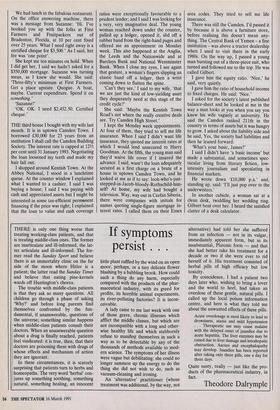If symptoms
persist . . .
TI-IERE is only one thing worse than treating working-class patients, and that is treating middle-class ones. The former are inarticulate and ill-informed, the lat- ter articulate and ill-informed. The for- mer read the Sunday Sport and believe there is an immortality clinic on the far side of the moon where Hitler is a patient; the latter read the Sunday Times and believe that eating pine-kernels wards off Huntington's chorea.
The trouble with middle-class patients is that they ask so many questions. All children go through a phase of asking 'Why?' and before long parents find themselves confronted by the fun- damental, if unanswerable, questions of the universe; something similar happens when middle-class patients consult their doctors. When an unanswerable question about a drug is finally reached, patients feel vindicated: it is true, then, that their doctors are poisoning them with drugs of whose effects and mechanism of action they are ignorant.
In these circumstances, it is scarcely surprising that patients turn to herbs and homeopaths. The very word 'herbal' con- jures up something soothing, something natural, something healing, an innocent little plant ruffled by the wind on an open moor, perhaps, or a tiny delicate flower blushing by a babbling brook. How could such a thing do any harm, especially compared with the products of the phar- maceutical industry, with its greed for profits, its horrible animal experiments, its river-polluting factories? It is incon- ceivable.
A lady came to me last week with one of those grave, chronic illnesses which afflict the middle classes, but which are not incompatible with a long and other- wise healthy life and which stubbornly refuse to manifqt themselves in such a way as to be detectable by any of the thousands of methods available to mod- ern science. The symptoms of her illness were vague but debilitating: she could no longer summon up the energy to do the thing she did not wish to do, such as vacuum-cleaning and ironing.
An 'alternative' practitioner (whose treatment was additional, by the way, not alternative) had told her she suffered from an infection — not in its vulgar, immediately apparent form, but in its insubstantial, Platonic form — and that she had better take his treatment for a decade or two if she were ever to rid herself of it. His treatment consisted of herbal pills of high efficacy but low toxicity.
By coincidence, I had a patient two days later who, wishing to bring a lover and the world to heel, had taken an overdose of these gentle, natural pills. I called up the local poison information centre, and here is what they told me about the unwanted effects of these pills:
Acute overdosage is most likely to lead to drowsiness, ataxia and mild hypotension . . . Therapeutic use may cause malaise with the delayed onset of jaundice due to acute hepatitis. The liver enzymes may be raised due to liver damage and intrahepatic obstruction. Ascites and encephalopathy may develop. Jaundice has been reported after taking only three pills, one a day for three days.
Quite nasty, really — just like the pro- ducts of the pharmaceutical industry, in fact.
Theodore Dalrymple


























































 Previous page
Previous page